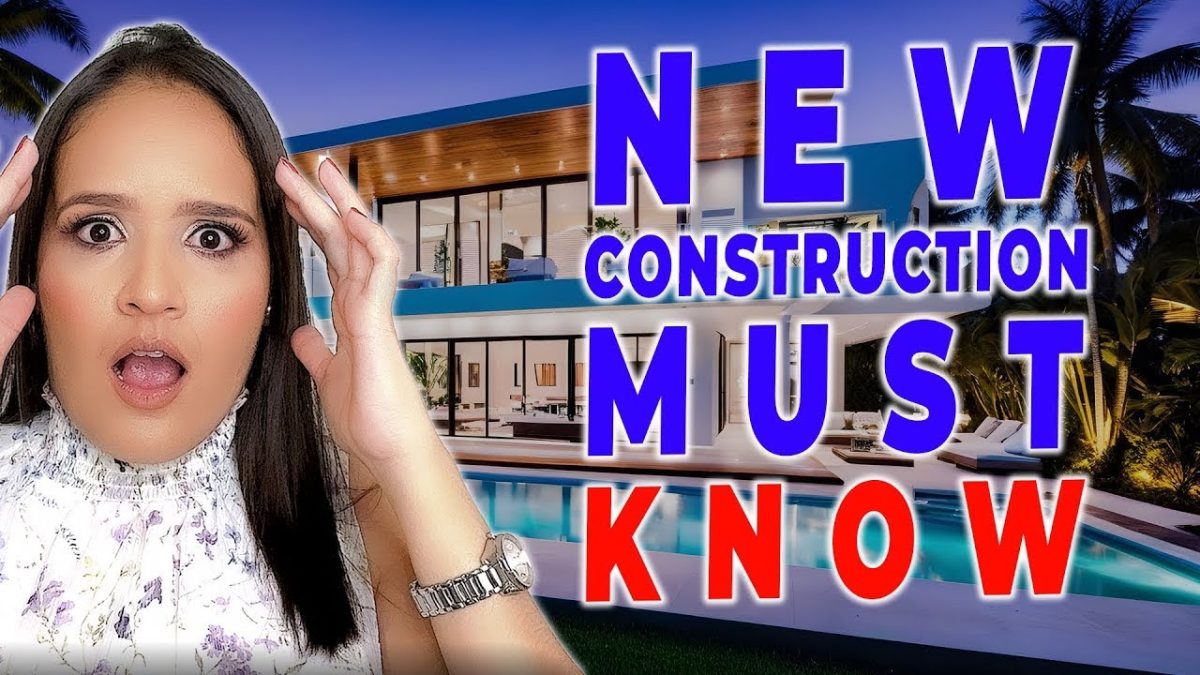Steps to Buying a New Construction Home: A Comprehensive Guide
Steps to Buying a New Construction Home:
A Comprehensive Guide
In this comprehensive guide, we’ll take you on a journey through the crucial steps to ensure your buying a new construction home as a seamless and satisfying experience. Whether you’re a first-time homebuyer or a seasoned real estate enthusiast, understanding the intricacies of buying a new construction home is paramount. We’ll explore the essential factors, from budgeting and location selection to builder research and contract signing, giving you the knowledge and confidence to make an informed decision. Let’s dive into the intricate world of new construction homes in this blog.
Buying a new construction home is an exhilarating adventure, but it’s essential to navigate the process with precision. Here’s our comprehensive guide to ensure you’re well-prepared for your journey into the world of new homes. Buying a New Construction Home
Number 1. Set A Budget
Obviously, the first step is to define how much money you can spend on your house. Well, before you start scrolling through those glossy home brochures, take a good, hard look at your wallet. I must mention that new construction homes can come with a heftier price tag, so it’s crucial to set your budget straight. I would say that falling in love with a dream home that’s way out of your financial league is tempting, but it’s not the smartest move. To dodge that heartache, you need to play it smart. First, take a deep dive into your income and spending. Calculate what you can comfortably afford without breaking the bank. Trust me, it is all about understanding your limits and setting some solid guidelines and most importantly, won’t go to see houses without knowing how much you can afford.
Number 2. Understand The Types Of New Construction Homes
When you are buying a newly constructed home, your role in the construction and design of your new abode can vary significantly. You can either buy a plot of land and oversee the entire construction project or you could just opt for a home in a carefully planned neighborhood built by a developer. Now, I will tell you about the three major types of new-construction homes. The first one is custom homes, which will let you create your dream home from scratch. But you will need to give a lot of time and it will be more costly. Next is semi-custom homes. You see, in higher-end neighborhoods owned by experienced developers, you’ll have some room for personalization. While your choices may be more limited compared to a custom build, you’ll still get to put your unique stamp on your future home. And the third type is spec or production homes, where you can typically choose from a range of paint colors, add-on options, and design models. Give it some time and carefully choose what type of new-construction home you want.
Number 3. Get Pre-Approved
Now, you need to secure pre-approval from a lender. For those who don’t know, pre-approval means that a lender is willing to offer you a loan after analyzing your financial situation, including factors like your credit score, employment history, income, assets, and even tax returns. And once you have that pre-approval letter in your hands, you’re not locked into a single lending option. You’re free to explore and compare other lenders to find the sweetest deal that suits your needs. Getting pre-approved is as easy as a few clicks. Yes, you can hop online, fill out an application, and quickly discover the loan amount you qualify for based on your current financial situation. However, talk first with a real estate professional because for example, builders often have preferred lenders, too, and sometimes it is better that, rather than using an external lender because of so many reasons and knowledge that realtor will suggest. Just remember to have your financial documents, like bank records and pay stubs, ready when they ask.
Number 4. Choose A Location And Research Builders
Next, you need to create a list of your preferred neighborhoods and research builders. You need to keep in mind that not every community is going to be your perfect match. You could be a young family on the hunt for a vibrant neighborhood, or a retiree in search of a 55+ paradise with a lineup of HOA activities. There are several factors that you need to consider while choosing the location or neighborhood, including commute times, distance to friends, educational institutes in the area, access to parks and lakes, availability of community clubhouses, sidewalks, etc. I would also suggest that you cruise around the neighborhoods to get a better idea of the amenities. Now, when it comes to home builders, you will find a colorful spectrum, from local gems to major national players. So, how do you make sure you’re teaming up with the right one? The best idea is to check online reviews about that builder. You can also check out their Better Business Bureau ratings. You can also consult an expert, which takes us to our next step.
Number 5. Hire A Real Estate Agent
Yes, you can find your dream home alone, however, hiring a real estate agent can make this journey smoother and it can save you a lot of money and time, as well. The friendly on-site agent you meet at the new construction office works for the builder, meaning for the seller. So, it is a wise move to bring in your own agent. And a real estate agent brings more to the table than you might think. They’ll scrutinize those incentives, offers and contracts, ensuring you don’t accidentally agree to terms that favor only the builder. Now, when is a real estate agent particularly invaluable? If you’re planning to buy production or semi-custom homes, where you’ll be face-to-face with a builder’s sales representative, having your agent by your side is a game-changer. Even in custom builds an agent with experience in new construction can be a handy ally, especially when it comes to financial details, timelines, and those tricky contractual matters.
Number 6. Sign A Builder Contract
Now, before you settle on a final price and sign the contract, you need to check out all your options. For example, if you are going for a custom or a semi-custom home, you need to make decisions on a number of factors like roof types, siding, and the kitchen’s size and design. And for production homes, the menu may be a tad shorter but don’t underestimate its impact on your wallet. Even with limited choices, these selections will still sway that final price. After you have reviewed all the options and negotiated the price, it is finally time to sign your contract. The type of new construction home you are after will shape this step. For example, if you are buying a move-in-ready home, it will be a standard real estate transaction. You make a down payment, move in, and start those monthly mortgage payments – pretty straightforward, right? However, things will be different if you are going to build your home from scratch. This contract will be more detailed, complete with an estimated completion timeline. Now, you must keep in mind that the more customized your home is, the trickier it can be to predict when it’ll be ready. This can become a puzzle if you’re selling your current home and need a place to live while your new one’s in the making. You’ll need to collaborate with the builder, your realtor, and your lender to work out the logistics, as your home loan can’t close until you can call your new place ‘home sweet home.’ Make sure that you understand the entire contract and your real estate agent has checked it. Moreover, I always recommend bringing in a lawyer for an extra layer of protection especially when we talk about custom homes. They’ll comb through the agreement and all its addendums before you put pen to paper.
Number 7. Prepare To Move In
Well, you have signed your contract, and the countdown to your new home is on. You need to be prepared before you shift to your new house. You might be looking to buy your old house before moving into your new house, so it is a good idea to talk to your realtor and agree on the best time to put your old house on the market. Another important thing to keep in mind is that you should not make any big purchases like a car or new furniture during this process. Why? Because it is crucial to safeguard your credit score and keep the mortgage plan on solid ground. Also, you don’t want to increase your expenses while you are already in the process of buying a new home, right?
Number 8. Schedule Inspection Of Your New Home
I know we are talking about a shiny new-construction home here but keep in mind that just because it is new does not mean it is going to be perfect. I must mention that local municipalities usually inspect new construction homes through the construction phase. These authorities provide a final certificate of occupancy, which your builder will get after inspections are complete. But you need to hire your own home inspector to double-check everything is fine. Same as hiring your own representation, your realtor when buying your new house to protect your interests and your pocket, well bringing in your own inspector is always recommended even in new construction.
As you embark on your journey to purchase a new construction home, remember that knowledge is your greatest ally. By following these comprehensive steps and enlisting the support of experienced professionals, you can confidently navigate the process. Your dream home awaits, and we’re here to help you make it a reality. So, contact us now, and let’s begin the journey together. Your dream home is just a click or a call away!
Thank you for reading. I look forward to connecting with you in Miami soon!
If you’re considering buying or selling in Miami, don’t hesitate. CLICK HERE or call me at 786-376-2398 to make your move.
Discover the wonders of this vibrant city and stay informed with my weekly recap NEWSLETTER . Gain valuable insights about Miami, FL and more that will greatly benefit you.
Take the next step in your real estate journey. Contact Sharon today and unlock the possibilities that await you!
Subscribe to my YouTube Channel: SUBSCRIBE!

Sharon Colón
Your Favorite Real Estate Agent in Miami
ΓEA⅃ Broker, LLC
786-376-2398
[email protected]
www.sharoncolonre.com


